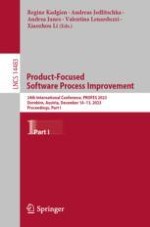2024 | OriginalPaper | Chapter
Assessing IDEA Diagrams for Supporting Analysis of Capabilities and Issues in Technical Debt Management
Authors : Sávio Freire, Verusca Rocha, Manoel Mendonça, Clemente Izurieta, Carolyn Seaman, Rodrigo Spínola
Published in: Product-Focused Software Process Improvement
Publisher: Springer Nature Switzerland
Activate our intelligent search to find suitable subject content or patents.
Select sections of text to find matching patents with Artificial Intelligence. powered by
Select sections of text to find additional relevant content using AI-assisted search. powered by
